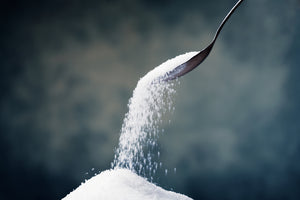Do you Have Hidden Sugars in Your Probiotics?
November 09, 2015

We’re often asked if our probiotics contain prebiotics, and more often than not, it seems to lead to whether it’s beneficial to take a prebiotic with a probiotic. This is a very confusing topic, especially if you’re just beginning to look at probiotics, as there is so much literature that talks about the necessary combination of a prebiotic and a probiotic. Prebiotics are designed to feed the probiotic and encourage its growth and feed the beneficial bacteria in our gut. It sounds like it makes common sense to combine them so you have the total package of the probiotics and the food they need to survive and thrive. Unfortunately, that’s only half of the story.
What are Prebiotics?
Prebiotics are a class of simple carbohydrates that are non-digestible by humans, and are found naturally in foods such as leeks, asparagus, chicory, Jerusalem artichoke, garlic, artichoke, onion, wheat, banana, and oats, as well as soybean. However, you would need to consume a large quantity of these foods for them to have any useful prebiotic effect. Then there are the commercial or chemically engineered forms of prebiotics, like Inulin and Fructo-oligosaccharides (FOS). Both of which are also non-digestible, but you should also be aware that FOS is used to make artificial sweeteners. Herein lies the problem.
Sugar as a Food Source
As we wrote in The Downside to Artificial Sweeteners, researchers have found that artificial sweeteners have a dramatic effect on gut microbes. The body doesn’t digest or absorb the materials directly, yet artificial sweeteners affect the composition and functionality of gut microbes, and those microbes play a critical role in digestion and overall health. When the balance of our gut microbiota is not in sync, critical functions like the absorption of certain vitamins, the breakdown of waste material, and resistance to harmful yeasts and bacteria can suffer. Furthermore, some types of FOS are derived from cane or beet sugar and since yeast uses sugar and sugar derivatives as a food source, it seems it would counteract any probiotic benefits taking a supplement that also contains a sugar derivative known to feed yeast.
FOS Doesn’t Discriminate
Aside from the hidden sugars, there are several other downsides to taking a prebiotic. One of which is that while they are designed to provide food for the beneficial bacteria in our GI tract, prebiotics are not selective as to which bacteria they feed and support. That means the bad bacteria may be being fed too. In fact, some scientific studies have shown that prebiotics increase the growth of “bad” bacteria such as Klebsiella pneumoniae and other less-friendly organisms such as E. Coli and many Clostridium species. Read more about this and other Probiotic Myth’s on our resource page here.
Natren’s Position
One of the compelling reasons that Natren is very much opposed to prebiotics is because of the undesirable side effects of FOS, as we mentioned in one of our previous blogs, The Facts About FOS. This chemically manufactured product has unpleasant side effects that counteract the benefits that probiotics are intended to deliver. While the body does not directly digest FOS, it stimulates the bacteria that are present in the gut causing rapid fermentation in the colon that can lead to bloating, abdominal pain, copious quantities of gas, cramps and diarrhea. Probiotics are designed to provide relief for the occasional digestive upsets so why supplement them and potentially experience side effects that you’re trying to avoid?
The Supernatant Advantage
All probiotics are live organisms that require nourishment in order to survive and flourish, and what sets Natren’s probiotics apart from the rest is our proprietary Supernatant Advantage. In our recent article about the Supernatant, we discussed why we retain the culturing medium – a nutritionally balanced food base formulation that is specifically selected for each bacteria strain to optimize the potential health-promoting properties of the bacteria. As the bacteria grow, not only do they transform the surrounding culturing medium into an active and very essential byproduct known as the supernatant, but they also produce very powerful active substances like hydrogen peroxide and acidophilin and vitamins that enhance the healthy properties of our probiotics. Natren’s probiotics contain their own food source. So, ask yourself why there’s a need to combine them with prebiotics, and risk the unpleasant side effects of artificial sugars on the digestive system?
The post Do you Have Hidden Sugars in Your Probiotics? appeared first on Natren Probiotics Blog.





Leave a comment